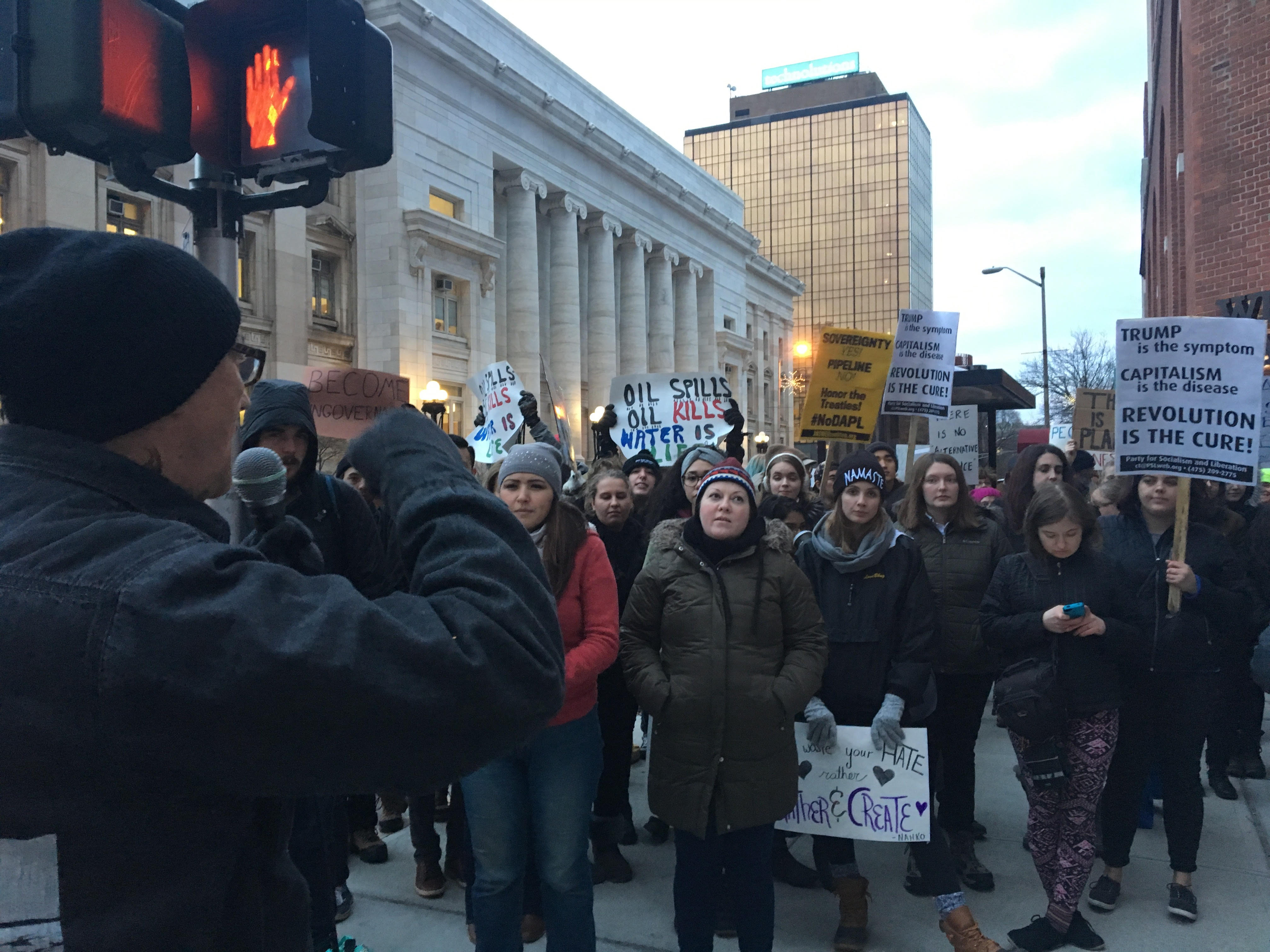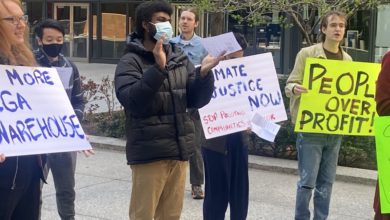On January 27, in immediate response to Trump’s announcement of a plan to fasttrack the Dakota Access Pipeline and Keystone XL pipeline, over 400 protesters gathered in New Haven to resist.
Led by ANSWER Coalition organizer and Indigenous activist Norman Momowetu Clement and journalist Melinda Tuhus, with the support of multiple Indigenous and environmental groups, the action targeted three of the banks invested in the pipelines.
This was the fourth in a series of recent Connecticut actions against DAPL. Representatives of multiple tribal nations were present, including the Quinnipiac, Schaghticoke, Cherokee, Osage, Flathead, Colville and many others, including representation from the Yale Native American Cultural Center.
The action started with a rally at Wells Fargo bank, where the action organizers introduced the event and explained the crisis. “Over the past week, I watched three pipelines leak – two in North Dakota,” said Clement. “There is no guarantee that they won’t leak. All of them have leaked. But the government and oil companies don’t care, because this is a matter of capitalist profit.” A few protesters were stationed outside the bank doors to hand out information about DAPL to people entering and exiting the bank.
Next, the group marched to a local Bank of America, right next to City Hall. The crowd marched in unison around the bank plaza demanding divestment from the pipeline.There, a number of Indigenous and environmental leaders spoke about the importance of unity in the struggle against a common evil — the Trump administration. Multiple speakers brought up the importance of building a united movement in support of immigrants, refugees, the Muslim community, LGBTQ people and scientists.
Tiana Crone, a young Schaghticoke woman who joined in the protest, shared her thoughts with Liberation News. “My tribe originates from the New England area, mostly inhabiting Connecticut and New York,” she said. “We are still going through a fight to gain back our recognition. By the time I was 9, I was already protesting at the state capitol to demand our rights back. Way too many tribes are forced to endure legal cases against the government simply because Native rights are not being legally respected.”
When asked why she felt this action was important, Tiana said: “This has been an issue since 1492. U.S. children are brainwashed to believe this optimistic man just happened to discover a ‘new’ land. Wrong. The truth is, Columbus was an evil and corrupted man who brought havoc to Natives. Mass genocide, rape, murder. Yet we have a holiday for him, but not Indigenous people.”
Crone said that the Trump agenda is a major risk to Native people: “Since Trump is the new puppet of the U.S., there will be oblivious citizens in agreement with whatever the new POTUS proposes. We have seen people publicly being racist, and they think it is OK to do so simply because the man in the Oval Office portrays ignorance. This is extremely serious and terrifying for many different people.”
However, she is optimistic about the movement: “It feels so good to believe in something and fight for what is ethically correct. My grandmother, who passed when I was only 7, is buried on our reservation amongst other family members and our ancestors. And I know if she were still here today and she saw me fighting for fellow Natives, she would be so proud of me… This all means justice. More Natives will be coming together to fight back. We will not back down.”
After leaving the Bank of America, the protest took to the streets, occupying the central Chapel Street for around an hour en route to TD Bank, and after arriving in front of it. Chants rang out declaring support for Standing Rock and Indigenous people’s right to their land and water. “You can’t drink oil! Keep it in the soil!” and “When Native lives are under attack, what do we do? Stand up, fight back!” were popular chants. For about 15 minutes, ANSWER organizer Momowetu led the chant “Mni Wi’coni – water is life!”
At the final bank, speakers urged divestment, saying that the only concept that large banks understood was financial gain, and that people need to stand up and show that exploitation will not be rewarded. Finally, a giant message was projected onto the bank, reading “Say No to the DAKOTA ACCESS PIPELINE (DAPL)”, while a contingent of the crowd filled the TD bank lobby.
This action in Connecticut was one of many across the country following Trump’s pledge to continue pushing the pipelines. Many have called out his personal investment in DAPL as a conflict of interest, but the problem clearly runs deeper — as long as capitalist profiteers like Trump are in power, our planet, Native sovereignty and the well-being of humans will be in need of our defense. Connecticut has pledged to stand together to support Standing Rock and fight against pipelines for as long as it takes.







